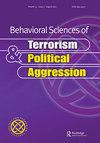Antiheroes fueled by injustice: dark personality traits and perceived group relative deprivation in the prediction of violent extremism
IF 1.3
Q2 POLITICAL SCIENCE
Behavioral Sciences of Terrorism and Political Aggression
Pub Date : 2021-05-25
DOI:10.1080/19434472.2021.1930100
引用次数: 6
Abstract
ABSTRACT Despite multiple studies providing evidence of subjective inequality and dark personality traits as predictors of extremism, their interactive effect on extremism has not been studied. As such interactions are implied in multiple models of radicalization, this research was focused on testing them. While Study 1 (N = 279), based on a convenient student sample, established the interaction between perceived group relative socio-political deprivation and Dark Triad traits in the prediction of support for political violence, Study 2 (N = 461), based on a quota sample, specified it in the context of radicalized intentions: emotional component of group deprivation (anger, contempt, and disgust) interacts with the Dark Tetrad in the prediction of radicalized but not activist intentions, even after correcting for social desirability bias. Their combined explanatory power (up to 25% of explained variance) robustly confirms the role of individual dispositions and (responses to the perception of) contextual factors, as well as their interactions, in radicalization.不公正引发的反英雄:暴力极端主义预测中的黑暗人格特征和感知的群体相对剥夺
摘要尽管多项研究提供了主观不平等和黑暗人格特征作为极端主义预测因素的证据,但它们对极端主义的交互作用尚未得到研究。由于这种相互作用隐含在激进化的多个模型中,本研究的重点是测试它们。而研究1(N = 279),基于一个方便的学生样本,在预测对政治暴力的支持时,建立了感知到的群体相对社会政治剥夺和黑暗三合会特征之间的相互作用,研究2(N = 461),基于配额样本,在激进化意图的背景下具体说明了这一点:群体剥夺的情感成分(愤怒、蔑视和厌恶)在预测激进化但非激进主义意图时与黑暗四重奏相互作用,即使在纠正了社会可取性偏见之后也是如此。它们的综合解释力(高达解释方差的25%)有力地证实了个体倾向和(对感知的反应)情境因素及其相互作用在激进化中的作用。
本文章由计算机程序翻译,如有差异,请以英文原文为准。
求助全文
约1分钟内获得全文
求助全文
来源期刊

Behavioral Sciences of Terrorism and Political Aggression
POLITICAL SCIENCE-
CiteScore
4.80
自引率
10.00%
发文量
27
 求助内容:
求助内容: 应助结果提醒方式:
应助结果提醒方式:


